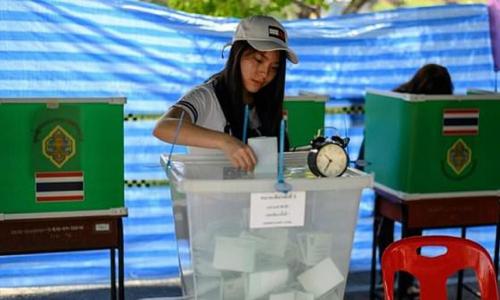Polls monitor says Thai election campaign 'heavily tilted' to benefit junta
The run-up to Thailand’s weekend vote was “heavily tilted” to benefit a party close to the ruling military junta, an Asian election monitor said on Tuesday, criticising a messy ballot-counting process that created mistrust.
Persistent confusion about results two days after Sunday’s vote has diminished hopes that the first election since a 2014 military coup would end nearly 15 years of political turmoil in Southeast Asia’s second-largest economy.
Official results are not due for weeks, but an opposition “democratic front” said it has attracted enough coalition partners to form a government, while a pro-army party also declared victory and said it would not accept anyone but junta leader Prayuth Chan-ocha as prime minister.
The Bangkok-based Asian Network for Free Elections (Anfrel) stopped short of declaring outright fraud in the election, in which victory has been claimed by both the pro-junta party and an opposition party linked to a self-exiled former premier.
“The environment at large is heavily tilted to benefit the military junta,” Amaël Vier, an official of the civil society group, told a news briefing. “A lot of people still express distrust toward the electoral process.”
Asked if the election had been free and fair, another Anfrel official declined to comment directly.
“So many things have to be considered together,” said its mission head, Rohana Nishanta Hettiarachchie. “It is unfair to conclude that the whole process was free and fair or not.”
Thailand’s Election Commission was not immediately available for comment. It has previously declined to comment on accusations of cheating.
The United States called for an “expeditious” announcement of Thailand’s election results, and urged Bangkok to conduct a “fair and transparent investigation” of reported irregularities, State Department spokesman Robert Palladino said.
With only partial results reported, the party backing junta leader Prayuth has said it is gathering coalition partners to form a government.
The main opposition Pheu Thai party, loyal to ousted former premier Thaksin Shinawatra, has alleged “irregularities”, and is considering legal challenges, while also saying it is putting together a coalition government.
It could be days or even weeks before it is clear whether either has won enough seats to form a stable government.
Race to parliament
Pheu Thai is leading, with 137 seats, versus 97 for Prayuth’s party, in unofficial results released on Monday by the Election Commission for 350 directly elected “constituency seats” in the 500-member House of Representatives.
But official results, including 150 more “party seats”, would not be available until May 9, said the election panel, which has blamed “human error” for delays and irregularities in early partial results.
A fuller picture could emerge on Friday, when the panel releases vote tallies for each constituency, used to determine the allocation of party seats in a complex formula.
Already, parties are making their own calculations on the basis of partial results and seeking coalition partners to form a government.
Pheu Thai’s secretary-general, Phumtham Wechayachai, said the party has secured more than 250 seats, or half the House, entitling it to form a majority government.
“We can confirm that we have secured more than 250 seats,” he said on Tuesday. The number includes its projected party list seats.
He named the Future Forward party as one partner in the “democratic front”.
Future Forward’s leader Thanathorn Juangroongruangkit was set to meet prosecutors over a cybercrime case, but prosecutors agreed to postpone to April 26.
He and two colleagues could face five years in jail if convicted of a charge of “uploading false information” in a speech posted on Facebook in June, which they have denied.
According to the constitution, a conviction could mean disqualification for Thanathorn, who is set to gain a party list seat in parliament.
While the convention is for the party with the most House seats to form a government, pro-army Palang Pracharat claimed legitimacy for its lead in the popular vote.
“We’re not in a hurry. There’s still time,” said party official Sonthirat Sontijirawong, when asked about coalition partners.
“Anyone wishing to form a coalition with us must accept General Prayuth Chan-ocha as the prime minister. We’re not giving up the position to anyone else.”
Prayuth, who as army chief seized power in 2014, said he was not involved in wooing coalition partners.
“I will focus on... leading the government until there is a new government,” he said in his first public comment after the election.
Since 2004, Thailand has been racked by street protests organized by both opponents and supporters of Thaksin, occasionally spilling into violence.
Parties linked to Thaksin have won every election since 2001, but the populist telecoms billionaire was thrown out by the army in 2006, and a government led by his sister was ousted in 2014.
- Reuters
RM12.50 / month
- Unlimited access to award-winning journalism
- Comment and share your opinions on all our articles
- Gift interesting stories to your friends
- Tax deductable
